| Listing 1 - 10 of 14 | << page >> |
Sort by
|
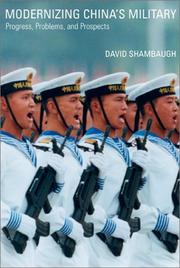
ISBN: 1282357913 9786612357916 0520938100 1597347604 9780520938106 0585466173 9780585466170 9781597347600 9780520225077 0520225074 0520225074 9781282357914 6612357916 0520242386 9780520242388 Year: 2002 Publisher: Berkeley University of California Press
Abstract | Keywords | Export | Availability | Bookmark
 Loading...
Loading...Choose an application
- Reference Manager
- EndNote
- RefWorks (Direct export to RefWorks)
David Shambaugh, a leading international authority on Chinese strategic and military affairs, offers the most comprehensive and insightful assessment to date of the Chinese military. The result of a decade's research, Modernizing China's Military comes at a crucial moment in history, one when international attention is increasingly focused on the rise of Chinese military power. Basing his analysis on an unprecedented use of Chinese military publications and interviews with People's Liberation Army (PLA) officers, Shambaugh addresses important questions about Chinese strategic intentions and military capabilities--questions that are of key concern for government policymakers as well as strategic analysts and a concerned public.
China - Armed Forces. --- China - Defenses. --- China-- Armed Forces. --- China --- Armed Forces. --- Defenses. --- HISTORY / Asia / General. --- asia scholars. --- asian studies. --- china. --- chinese government. --- chinese history. --- chinese military. --- foreign policy. --- international politics. --- interviews. --- military buffs. --- military capabilities. --- military forces. --- military history. --- military issues. --- military power. --- military prospects. --- military strategies. --- modern history. --- modernization. --- nonfiction. --- peoples liberation army. --- pla. --- policymakers. --- political science. --- political. --- social progress. --- strategic analysts.
Book
ISBN: 9781442219694 9781442219700 9781442219717 1442219718 1442219696 144221970X Year: 2013 Publisher: Lanham : Rowman & Littlefield Publishers,
Abstract | Keywords | Export | Availability | Bookmark
 Loading...
Loading...Choose an application
- Reference Manager
- EndNote
- RefWorks (Direct export to RefWorks)
United States --- China --- Foreign relations --- Relations internationales --- Chine --- États-Unis --- Relations --- United States - Foreign relations - China --- China - Foreign relations - United States
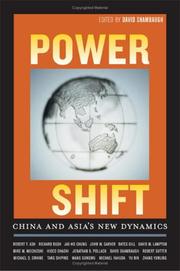
ISBN: 1423731484 9786612771958 1282771957 0520939026 1598758063 9780520939028 9781423731481 9781598758061 9780520245372 0520245377 9780520245709 0520245709 0520245377 0520245709 661277195X 9781282771956 Year: 2006 Publisher: Berkeley University of California Press
Abstract | Keywords | Export | Availability | Bookmark
 Loading...
Loading...Choose an application
- Reference Manager
- EndNote
- RefWorks (Direct export to RefWorks)
The dynamics of international relations in Asia are undergoing broad and fundamental changes that are reverberating around the world. Primary among the catalysts of change in the region is the rise of China as the engine of regional economic growth, as a major military power, as a significant voice in regional diplomacy, and as a proactive power in multilateral institutions. With in-depth assessments by seventeen of the world's leading experts on China's foreign relations, this groundbreaking volume offers the most timely, up-to-date, and comprehensive analysis of China's emerging influence on international relations in Asia. The contributors explore the various dimensions of China's rise, its influence on the region, the consequences for the United States, and alternative models of the evolving Asian order. What emerges is a clear picture of China increasingly at the center of the regional web; while North Korean and Taiwan could erupt in conflict, the predominant trend in Asia is the creation of an extensive web of mutual interdependence among states and non-state actors. Providing the best overview we currently have of the changing political balance on the Asian continent, this accessible volume will be essential reading for anyone concerned with contemporary Asian affairs.
International relations. --- Coexistence --- Foreign affairs --- Foreign policy --- Foreign relations --- Global governance --- Interdependence of nations --- International affairs --- Peaceful coexistence --- World order --- National security --- Sovereignty --- World politics --- Asia --- China --- Asian and Pacific Council countries --- Eastern Hemisphere --- Eurasia --- Cina --- Kinë --- Cathay --- Chinese National Government --- Chung-kuo kuo min cheng fu --- Republic of China (1912-1949) --- Kuo min cheng fu (China : 1912-1949) --- Chung-hua min kuo (1912-1949) --- Kina (China) --- National Government (1912-1949) --- China (Republic : 1912-1949) --- People's Republic of China --- Chinese People's Republic --- Chung-hua jen min kung ho kuo --- Central People's Government of Communist China --- Chung yang jen min cheng fu --- Chung-hua chung yang jen min kung ho kuo --- Central Government of the People's Republic of China --- Zhonghua Renmin Gongheguo --- Zhong hua ren min gong he guo --- Kitaĭskai︠a︡ Narodnai︠a︡ Respublika --- Činská lidová republika --- RRT --- Republik Rakjat Tiongkok --- KNR --- Kytaĭsʹka Narodna Respublika --- Jumhūriyat al-Ṣīn al-Shaʻbīyah --- RRC --- Kitaĭ --- Kínai Népköztársaság --- Chūka Jinmin Kyōwakoku --- Erets Sin --- Sin --- Sāthāranarat Prachāchon Čhīn --- P.R. China --- PR China --- Chung-kuo --- Zhongguo --- Zhonghuaminguo (1912-1949) --- Zhong guo --- Chine --- République Populaire de Chine --- República Popular China --- Catay --- VR China --- VRChina --- 中國 --- 中国 --- 中华人民共和国 --- Jhongguó --- Bu̇gu̇de Nayiramdaxu Dundadu Arad Ulus --- Bu̇gu̇de Nayiramdaqu Dumdadu Arad Ulus --- Bu̇gd Naĭramdakh Dundad Ard Uls --- Khi︠a︡tad --- Kitad --- Dumdadu Ulus --- Dumdad Uls --- Думдад Улс --- Kitajska --- China (Republic : 1949- ) --- Relations --- PRC --- P.R.C. --- BNKhAU --- БНХАУ --- Asia - Relations - China - Congresses --- China - Relations - Asia - Congresses --- 20th century. --- asia scholars. --- asia. --- asian economy. --- asian history. --- asian studies. --- china. --- chinese politics. --- contemporary asia. --- diplomacy. --- dominant power. --- economic development. --- economic growth. --- economics. --- foreign relations. --- globalization. --- historians. --- historical. --- international relations. --- military power. --- modern politics. --- north korea. --- political history. --- political power. --- political science. --- power dynamics. --- regional history. --- russia. --- taiwan.
Book
ISBN: 1299456758 0199860157 9780199860159 9780199860142 0199860149 0199323690 9780199323692 9781299456754 9780199361038 0199361037 Year: 2013 Publisher: Oxford New York Oxford University Press
Abstract | Keywords | Export | Availability | Bookmark
 Loading...
Loading...Choose an application
- Reference Manager
- EndNote
- RefWorks (Direct export to RefWorks)
"Most global citizens are well aware of the explosive growth of the Chinese economy. Indeed, China has famously become the "workshop of the world." Yet, while China watchers have shed much light on the country's internal dynamics--China's politics, its vast social changes, and its economic development--few have focused on how this increasingly powerful nation has become more active and assertive throughout the world. In China Goes Global, eminent China scholar David Shambaugh delivers the book that the world has been waiting for--a sweeping account of China's growing prominence on the international stage. Thirty years ago, China's role in global affairs beyond its immediate East Asian periphery was decidedly minor and it had little geostrategic power. As Shambaugh charts, though, China's expanding economic power has allowed it to extend its reach virtually everywhere--from mineral mines in Africa, to currency markets in the West, to oilfields in the Middle East, to agribusiness in Latin America, to the factories of East Asia. Shambaugh offers an enlightening look into the manifestations of China's global ambitions: its extensive commercial footprint, its growing military power, its increasing cultural influence or "soft power," its diplomatic activity, and its new prominence in global governance institutions. But Shambaugh is no alarmist. In this balanced and well-researched volume, he argues that China's global presence is more broad than deep and that China still lacks the influence befitting a major world power--what he terms a "partial power." He draws on his decades of China-watching and his deep knowledge of the subject, and exploits a wide variety of previously untapped sources, to shed valuable light on China's current and future roles in world affairs"-- "In China Goes Global, eminent China scholar David Shambaugh delivers the book that the world has been waiting for--a sweeping account of China's growing prominence on the international stage. Thirty years ago, China's role in global affairs beyond its immediate East Asian periphery was decidedly minor and it had little geostrategic power. As Shambaugh charts, though, China's expanding economic power has allowed it to extend its reach virtually everywhere--from mineral mines in Africa, to currency markets in the West, to oilfields in the Middle East, to agribusiness in Latin America, to the factories of East Asia. Shambaugh offers an enlightening look into the manifestations of China's global ambitions: its extensive commercial footprint, its growing military power, its increasing cultural influence or "soft power," its diplomatic activity, and its new prominence in global governance institutions. But Shambaugh is no alarmist. In this balanced and well-researched volume, he argues that China's global presence is more broad than deep and that China still lacks the influence befitting a major world power--what he terms a "partial power." "--
Globalization --- China --- Foreign economic relations. --- Economic policy --- E-books --- Globalization - China. --- China - Foreign economic relations. --- China - Economic policy - 2000 --- -Globalization
Book
ISBN: 9814818771 9814818763 Year: 2018 Publisher: Singapore : ISEAS-Yusof Ishak Institute,
Abstract | Keywords | Export | Availability | Bookmark
 Loading...
Loading...Choose an application
- Reference Manager
- EndNote
- RefWorks (Direct export to RefWorks)
The United States maintains a comprehensive and robust presence throughout Southeast Asia that has grown dramatically since the 1980s. It includes the commercial, security, education and diplomatic, and other domains. America's strengths and contributions to the region lie particularly in both hard and soft power, but the U.S. economic footprint is both broad and deep. However, this presence is not very well appreciated or reported by regional media - whereas China's presence and influence is pervasive. Most Southeast Asian governments are often reluctant to recognize or publicize the U.S. presence or contributions to regional security, stability, and growth. America's diplomatic engagement of ASEAN and the region has rightly been criticized for its episodic engagement, and Washington should substantially elevate Southeast Asia within its broader Asian and Indo-Pacific diplomatic priorities. Southeast Asia was made the highest priority ever for Washington during the Obama administration. While receding somewhat under the Trump administration, the region remains an important priority - but Washington must devote sustained attention to match the region's importance to American national interests. As U.S.-China competition escalates, Southeast Asia will become an epicentre of this competition. Southeast Asian states and societies may not realize the significance of the escalating U.S.-China competition for them, as most countries are internally preoccupied and buy into ASEAN's rhetoric of inclusive engagement of external powers. Southeast Asian countries are likely to become increasing objects of this competition, and it will be become increasingly difficult for them to ignore it. Meanwhile, Southeast Asian states and ASEAN must elevate their own emphasis and engagement with the United States. The U.S. brings many more strengths and benefits than does China and is a far more comprehensive actor in the region. In particular, it would be helpful if ASEAN and its member states would more publicly recognize the contributions and importance of the United States.
Geopolitics --- World politics --- ASEAN. --- Association of Southeast Asian nations --- Southeast Asia --- United States --- Foreign relations --- China-Foreign relations-United States. --- Southeast Asia-Foreign relations-United States. --- United States-Foreign relations-2009-2017. --- United States-Foreign relations-2017-. --- United States-Foreign relations-China. --- United States-Foreign relations-Southeast Asia. --- POLITICAL SCIENCE / International Relations / General. --- China --- United States. --- Foreign relations, 2009-2017. --- Foreign relations, 2017-.
Book
ISBN: 0190914971 0190091134 019091498X 0190914998 Year: 2021 Publisher: New York : Oxford University Press,
Abstract | Keywords | Export | Availability | Bookmark
 Loading...
Loading...Choose an application
- Reference Manager
- EndNote
- RefWorks (Direct export to RefWorks)
'Where Great Powers Meet' explores the global competition for power between the United States and China. Focusing on Southeast Asia, David Shambaugh looks at how ASEAN (the Association of Southeast Asian Nations) and the countries within it maneuver between the US and China and the degree to which they align with one or the other power. Not simply an analysis of the region's place within an evolving international system, Where Great Powers Meet provides us with a comprehensive strategy that advances the American position while exploiting Chinese weaknesses.
Southeast Asia --- Asia, Southeast --- Asia, Southeastern --- South East Asia --- Southeastern Asia --- Foreign relations
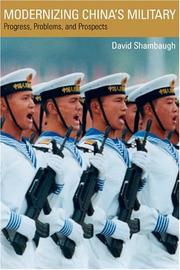
ISBN: 0520242386 Year: 2004 Publisher: Berkeley, Calif. ; London : University of California Press,
Abstract | Keywords | Export | Availability | Bookmark
 Loading...
Loading...Choose an application
- Reference Manager
- EndNote
- RefWorks (Direct export to RefWorks)
China --- China --- Armed Forces. --- Defenses.
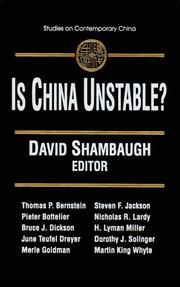
ISBN: 1315292009 1315292017 1315291991 9781315292007 9780765639967 0765639963 0765605724 0765605732 1315291983 Year: 2015 Publisher: Milton Park Taylor and Francis
Abstract | Keywords | Export | Availability | Bookmark
 Loading...
Loading...Choose an application
- Reference Manager
- EndNote
- RefWorks (Direct export to RefWorks)
Economic stabilization --- China --- Economic conditions --- Politics and government
Book
ISBN: 0691227764 Year: 1993 Publisher: Princeton, NJ Princeton Univ. Press
Abstract | Keywords | Export | Availability | Bookmark
 Loading...
Loading...Choose an application
- Reference Manager
- EndNote
- RefWorks (Direct export to RefWorks)
From President Nixon's historic visit to China in 1972 to the aftermath of the Tiananmen tragedy, this book examines the changing perceptions of the United States articulated by China's "America Watchers," whose occupation is to interpret the "beautiful imperialist" for China's elite and public. While other studies have looked at the behavioral history of U.S.-China relations, this is the first to probe the perceptual dimension.
Public opinion --- History --- United States --- Foreign public opinion, Chinese. --- Academy of Military Sciences. --- American Legion. --- American Studies Association. --- Boston financial group. --- Carter administration. --- Central Party School. --- Democratic Party. --- Foreign Affairs College. --- Fudan University. --- General Electric. --- Harvard University. --- Hearst newspapers. --- Hoover Institution. --- Institute of Economics. --- John Birch Society. --- Keynesianism. --- Khrushchev era. --- Lehman Brothers. --- Litton Industries. --- Marxism-Leninism. --- Middle East policy. --- National Security Agency. --- New Federalism. --- Occidental Petroleum. --- affluence. --- arms sales. --- banks and banking. --- bureaucracy. --- capital accumulation. --- concentration of capital. --- consumer goods. --- democracy. --- developing countries. --- drug problem. --- economists. --- electoral college system. --- establishment intellectuals. --- exchange scholars. --- finance capital. --- government publications. --- ideology. --- industrialization. --- intelligence research. --- investment overseas. --- journalists. --- media and politics. --- nongovernmental actors. --- opinion groups. --- peaceful coexistence. --- periodicals. --- political parties. --- pressure groups. --- racial discrimination.
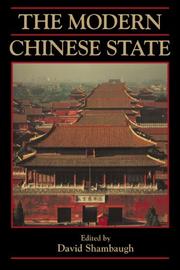
ISBN: 9780511528194 9780521772341 9780521776035 Year: 2000 Publisher: Cambridge Cambridge University Press
Abstract | Keywords | Export | Availability | Bookmark
 Loading...
Loading...Choose an application
- Reference Manager
- EndNote
- RefWorks (Direct export to RefWorks)
| Listing 1 - 10 of 14 | << page >> |
Sort by
|

 Search
Search Feedback
Feedback About UniCat
About UniCat  Help
Help News
News